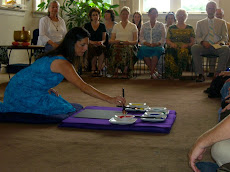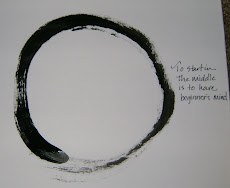...are awfully (as in awful) wonderful (to me). They invoke feelings of terror and dread, often presenting themselves in the form or paralysis and/or procrastination (see prior entry). They also elicit feelings of joyful anticipation, giddy excitement often supported by inner-super hero powers (meaning, I picture myself wearing my own personal Wonder Woman get-up and wielding a don't-mess-with-me rope) knowing I can handle anything that comes my way: "World, watch out - here I come!"
I have put off writing an entry for two days, and I can not put it off any longer. I have committed myself to completing this M.A. program, and the only way to do that is to write my thesis. One of the things that I know will serve me best in this process is writing...journaling - my thoughts, feelings, ideas, and experiences. While my original thought was to do it on paper - particularly because it so tactile, so authentic, I realized that I needed to formally commit to this practice and hold myself accountable. I figured if I "published" this, knowing one or two or even three people may read it as I navigate my way through this journey, it will keep me accountable to posting daily. I also had a great "aha" about writing in blog form: I can cut and paste what I wrote, if I want to use it in my thesis (good idea, no?!).
Interestingly, as I am beginning the thesis process, a new year has begun for all of us, and that also means a new semester at school for both myself and my students. Monday (January 4) was our first day back and while I spent most of the week pulling magic out of my butt (I didn't have much time to prep over break because I was working on long, narrative student evaluations for the last five days of my vacation), the atmosphere of my classroom and the things that were happening in there were...well, magical!
One of the coolest things for me, happened in the first few moments of our very first day back. Every morning at the beginning of the day and each afternoon before we leave school, my students and I bow to one another. We have done this since day one of the school year. We do it as a mindfulness practice, reminding ourselves to respect ourselves, one another, our classroom space, and the work we do in it. On Monday, there was a buzz of excitement in the air, and my students all seemed happy to be back at school and with one another. When the time came to take our opening bow, the room feel completely silent as everyone prepared to place their hands on their upper thighs. We bowed, and when we came back up almost every single person in the room - including me - was smiling. We were together again. We were a community.
During our Drama class, first period (and third, with my other section of 6th graders), we "kissed" 2009 goodbye. I explained to the class what it meant to "kiss something goodbye," and quoted the words from A Chorus Line: "Kiss today goodbye, and point me toward tomorrow." I gave each student a Hershey's Kiss, and encouraged each of them to make a quasi-lay-up with it - throwing it into a wastebasket as they said the words, "I kiss goodbye to _______" whatever it was they wanted to leave behind from last year (for those that couldn't think of anything, I asked that they simply say,"Goodbye to 2009"). One of my students journaled, "It was really nice to yell off what we wanted to say goodbye to and get it off our chest."
In Language Arts, I passed out the January Monthly (I give the students hand-outs at the beginning of every month that explains the origins of the month, its gemstone, its flower, how many days it has, and the holidays and special observance days of the month. Sometimes we incorporate what's on the "Monthly," sometimes we don't). January was named after the Roman god, Janus, god of doorways and new beginnings. Janus is most often depicted with two faces: one looking into the past, the other towards the future.
As a segue into the new semester, I had the students work in pairs to create two Janus-like pictures. Each student was given a piece of drawing paper and asked to fold it in half width-wise. Next the students were instructed to pencil-sketch a profile of a face looking towards the past, starting from the fold in the paper. They then had to exchange their paper with another student, without showing them what they had drawn (so they handed the paper to another student with the blank side up). Upon receiving the blank-sided paper, the students were then asked to pencil-sketch a profile looking towards the future. Two more exchanges were made so that each student could add to their picture(s) with color and detail. Then each student brought their original picture home and was asked to complete both sides as homework. They were encouraged to add more color, detail, and to even add items that would make the picture 3-dimensional.
One student wrote about the experience with the Janus pictures from this perspective: "I had a great time doing this because the picture represented a person's expression when they looked into the past: sad, wistful, or angry, and when they looked into the future: happy, excited, or elated. This picture reminded me of what we talked about on New Year's Eve. My parents had invited our friend (their friend as well) to talk to everyone at our party about what we should look forward to and back on this new year. He said we should look back on the sins or mistakes we made in the past year and ask God to help us not make the same mistakes over again this year. Our friend also told us that even though we think that we can conceal our sins from others, God knows and He wants us to confess our sins to Him so that we can start a new beginning."
Uh...wow.
I allotted some extra time at the end of our first day back to toast the New Year. I brought in sparkling grape juice and party blowers. Each student was given a cup of juice and blower, and asked to get quiet for a moment and think about an aspiration they would like to make for themselves in this new semester. We then raised our glasses in a toast, yelled out our aspirations at the same time, and drank our juice and blew our horns. From another student journal: "I really enjoyed the first day (kissing 2009 goodbye and saying hello to 2010) because I made a goal to get awesome grades. It helps when I'm doing homework and I'm tired and I wanna go to bed to think of my goal for 2010."
We completed our day, with a bow, and our daily chant: tapping the palms of our hands on our desks twice, and saying: "And so it is," meaning: we have done all we can do today. What's done is done. Tomorrow we will start anew. As the students leave the classroom I call off to them, "Go make the world a better place." On Monday, it felt like we already had.
This last week I also had my students "wrap up 2009" by symbolically wrapping up their journals from last semester in wrapping paper. I will put them away and return them to the students at the end of the school year. I remember when I did that last year what fun it was for my kids to re-read their reflections from the first semester and note their own growth throughout the second.
Like my own feelings about beginnings (as mentioned above), Janus is, and of himself, a paradox: the past and the future all in one. Because we are beginning our unit on ancient Greece next Monday, I gave the students a list of Greek root words to keep in their binder for reference and I gave them their first vocabulary word of the semester: paradox. Besides looking up the word in the dictionary, and then writing the definition down in their own words (as we always do), I also asked them to research paradoxes and to bring in three examples. The students really seemed to enjoy this and we spent some time working through what the differences are between paradoxes and oxymorons and play on words.
At any rate, the word paradox seemed appropriate for me. A good reminder of how there are so many sides to everything. That life isn't black and white. I'm not. My students aren't. And neither is my thesis or the process of writing it.
Lizard Coloring Page
2 years ago





No comments:
Post a Comment